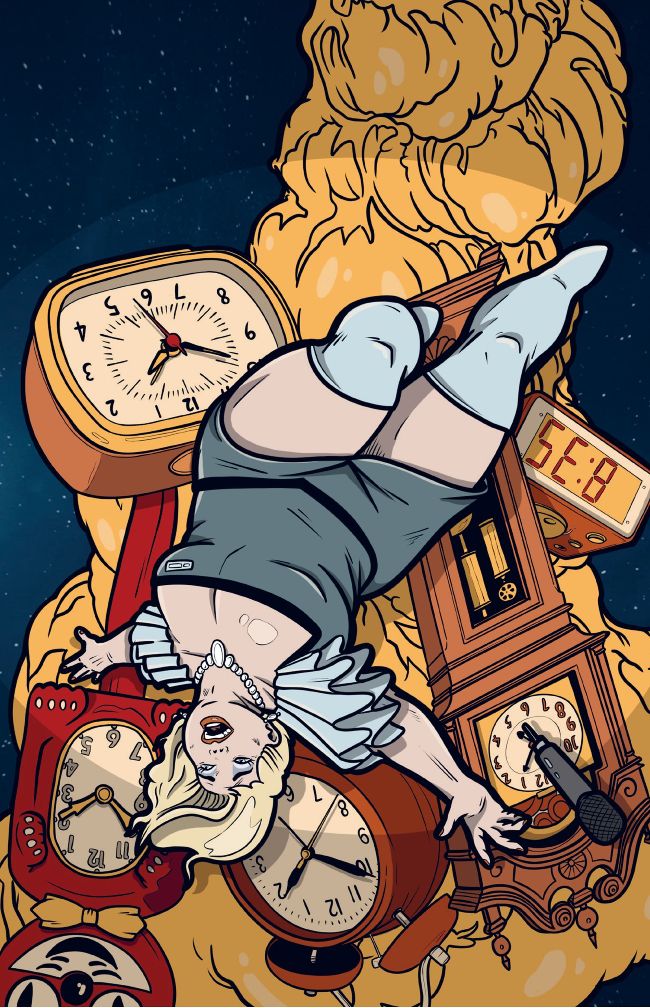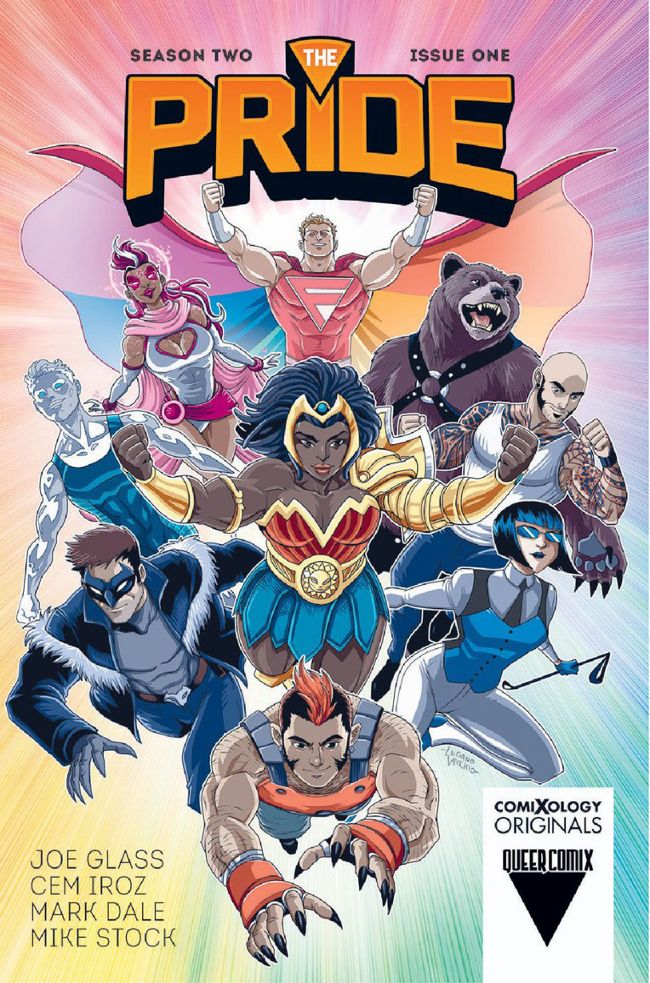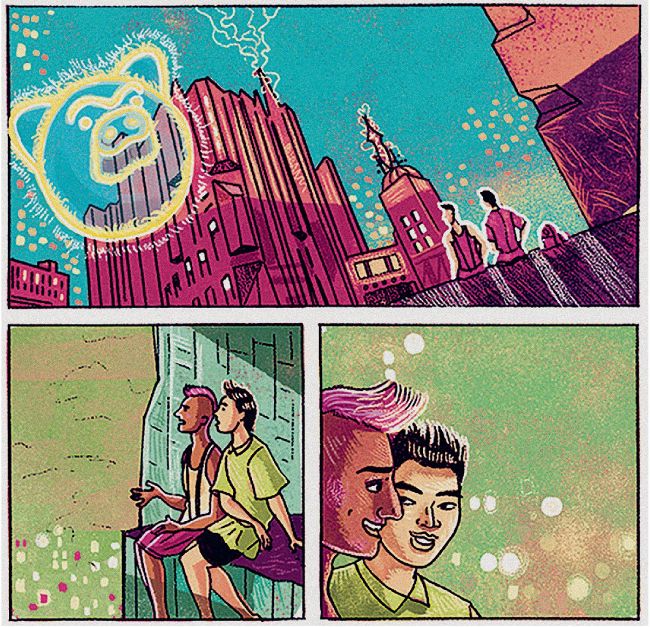SHABLAM!
While the comic world has queer fans by the multitude, LGBT+ stories in those pages have been almost non existent until recent years. Chris Rooke looks at how the independent comic scene is leading the charge in terms of queer representation.
Chris Rooke
Shablam! Patrons of queer bars and viewers of Drag Race might know it as a death drop. But to many outside our community, the first thing that comes to mind might be a sound eff ect from a comic book complete with a spiky text bubble and eye-popping colours. Those two worlds intersected briefly in December 2018 when Shade was introduced to Marvel Comics readers.
A last-minute introduction in creator Sina Grace’s recent run of Iceman (one of Marvel’s most visible gay superheroes), Shade is a queer drag queen mutant member of the X-Men. Readers were quick to celebrate her introduction online, but with only one subsequent appearance since (with a new superhero alias: Darkveil) it’s unclear where her future lies within Marvel’s comics.
Grace gave more insight into the situation at Marvel last June, publishing a post on his Tumblr describing the working environment and attitude during his time on Iceman. “From the get-go, my first editor asserted that Iceman would be DOA if it were ‘too gay’,” he wrote. When Grace introduced Darkveil, knowing that she might be popular, “I asked [my editor] how we should promote her. He said: ‘leave it up to the reader’s interpretation.’”
The reaction from readers was positive but, according to Grace, Marvel refused to leverage it into promoting the series.
Where Marvel and larger publishers may have dropped the ball when it comes to visible queer characters or creative teams, the indie comics scene has seized on the opportunity. “Coming out, was a big X-Men reader and you can see a really strong metaphor for the LGBT+ experience. But at the time, there was no visible openly gay character that could relate to,” recalls British comics writer Joe Glass. “I felt like wanted to tell a story where the queer characters get the focus and get to be the heroes. And that was how The Pride started.”
The Pride follows a group of visibly queer superheroes as they work to save lives while combatting the forces of queer-phobia that they encounter. Season two, which is released this month, sees the group expand in numbers dramatically, and with that the identities of the heroes in the group. “It sort of became my raison d’être to keep adding more queer representation and parts of our community to show that queer identity is a spectrum, and to let people who never get to see themselves in this beloved medium of theirs get that chance to be the hero,” Glass explains. “The big thing we wanted to do was add a trans masculine character because there’s so few trans male characters in pop culture. And we added some neurodiverse characters, and an older gay man character. We just tried to broaden things out a bit more.”
Expanding the range of identities portrayed in comic pages has increasingly become a focus for indie comic creators. “The comic industry has an unfortunate tendency to always try to replicate past successes rather than to innovate, and that extends to the creators it gives opportunities to,” according to Andrew Wheeler, the Toronto-based comics writer who edited Shout Out, an anthology comic book of queer stories published last May. He has more recently written Freelance- a new queer superhero comic. “Queerness is intersectional. It crosses over within itself, and it crosses over with other identities. It’s impossible to give every reader the chance to see themselves represented, but we wanted to take that as far as we could with the work that we had, and we were tremendously lucky in what we got to work with.”
Anthologies naturally also lend themselves to allowing for exploration of a wider range of genres than single graphic novels. Shout Out’s stories tend to lean on fantasy elements, which Wheeler felt was apt given the content. “I think fantasy is often a form of outsider fiction,” he says. “The hero is typically exceptional, but isolated. An orphan, a freak, a prodigy, who has to take on a gigantic and outdated institution. This resonates with queer people because it leans in to the idea that being diff erent has a price, but it’s also the source of our magic.”

Fanny Galactic art by Edward Bentley
Closer to home, a new publisher in Ireland plans to replicate the success of the anthology format. They’re giving the format a bit of a twist, however. “The face of this new venture is Dorothy Kale, an ageing drag queen who has been there and seen it all. She’s now telling some of the tales she’s heard via the medium of comics,” editor Chris Fildes details. “She had to retire from drag: last time she tried to lip-sync she broke her hip and accidentally glassed a dancer when her gin and tonic went flying. So this keeps her out of trouble. But that’s just the tip of the iceberg when it comes to the mysterious Dorothy, as will be revealed over time in our publications.”

The Pride
Fildes is focusing on horror and sci-fi in the first run of stories. “Our stories will be in your face, funny, and unapologetically queer,” he says, “Hey Dorothy came about as was working on my own story ‘Fanny Galactic’. My request for an artist resulted in so many submissions by superb artists that just really wanted to work with as many of them as possible. grew up reading 2000AD and the opportunity to do something similar was irresistible once started to think about it.”
Naturally, the anthology structure gives space to a whole range of queer creators to showcase more intimate and personal stories, including many who have not been published before. For TO Comix, publisher of Shout Out, it has been a core mission since early on. “If you’re a writer with an idea, finding artists willing to work with you can be very tough,” Steven Andrews, one of the founders of TO Comix who now runs the publishing company, explains. “We allow folks to apply just as a writer or just as an artist, and we’ll try to pair folks up, we’ll try to give people the opportunity to make those networking connections and that first leap into this space, and then have our editors work very closely with that team, helping them know what to expect from the industry and supporting and challenging them to do their best possible work.”
Andrews operates the company in his spare time while also holding down a full-time job. Their projects are largely funded through Kickstarter campaigns - access to which has enabled their ability to continue producing books, although without removing all of the barriers. “If we didn’t have access to crowdfunding we would not exist,” Andrews tells me. “The amount we raise on Kickstarter is not enough to actually fund the books, it’s seed money to make sure the book can happen. I’m tapping into my life savings to actually print the books.”
The funding model does lead to limitations when it comes to the types of book that TO Comix can produce. “Anthologies give us the widest possible audience. keep trying to do graphic novels, but run into this absolute brick wall that just don’t have the money,” Andrews tells me.
Glass on the other hand has had luck in finding a publisher who is willing to put money behind a collected story. Comixology Original, a digital comics publishing service owned by Amazon, funded season two of The Pride based on the work and the reaction to the first volume. “The Pride season one individual issues were all funded out of my own pocket as they were coming out and basically wiped me out, so it was one of those things that couldn’t do again,” Glass recalls. “Comixology have been fantastic: they give you an advance so that you can make the project, and was able to have an artist who could commit to the full season because we knew that there was going to be the money there to do it.”
In some readers’ minds, The Pride’s focus on superheroes might place it in tough competition with Marvel and DC’s line-ups, but Glass believes there’s more to it than just that. “In my mind superheroes are a genre. It’s not bespoke to those two companies,” he argues, “There are so many different kinds of superhero stories that they’re just not telling and that they don’t want to tell or couldn’t tell within the structures of their own universes: there’s just no way that Marvel, DC, are going to do a book about upwards of a dozen characters who are all completely LGBT+ when sales are a huge factor in continuing to make it. So there is scope out there to do superhero stuff which isn’t competing.”
Andrews agrees with the argument that there is too little change in the large publishers. “There’s a lot of interesting comic heroes coming out but at the same time, the writing base and the editorial base at DC and Marvel hasn’t really changed. It’s the same names and the same faces,” he says. “When it comes to marginalised identity, folks can read fakeness in a work, they can look at it and see it’s not authentic. It’s a watered down low fat version of their actual identity and there isn’t really a hook for them to get on board.”

Love In the Cloud by Derrick Chow
Where the indie comics industry really shines and excels, then, is in its willingness to lift the profiles of both queer characters and creators in a way that the larger publishers might not, and that benefits both readers and creative teams. “What want to do is try and pay it forward as much as can,” says Glass. “So, whenever have the opportunity to help someone out, want to try and do that. Hopefully we can keep giving opportunities to more people who are finding that their voices aren’t being heard. Not just the chance to see themselves in the fictional characters but also a chance to actually use their voice as well.”
Andrews concurs: “With Shout Out, a lot of folks who applied were isolated queer folks in different countries who didn’t necessarily even know anybody else who’s queer, or didn’t have a community. They had voices and stories they wanted to share, but they had no avenue to do that. By helping connect them with other artists and writers, we gave them a little bit of community and a work they can now point to. And hopefully they’ll be able to use that to build communities, wherever they are.”
‘The Pride: Season One and Season Two’ are available digitally at
comixology.co.uk. ‘Shout Out’ is available digitally and in print fromshoutoutanthology.com. ‘Hey, Dorothy!’ will begin publishing this year, and updates can be found at @heydorothycomic on Instagram.